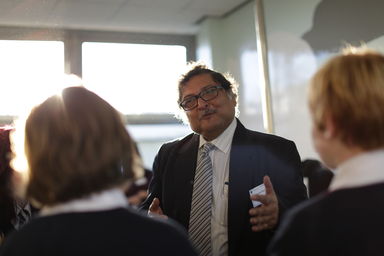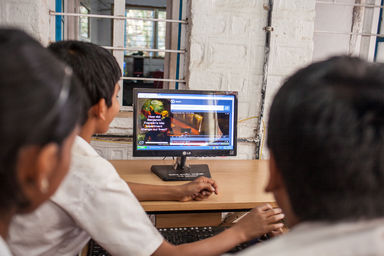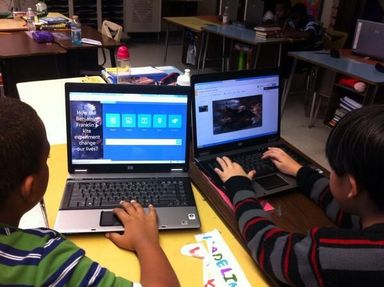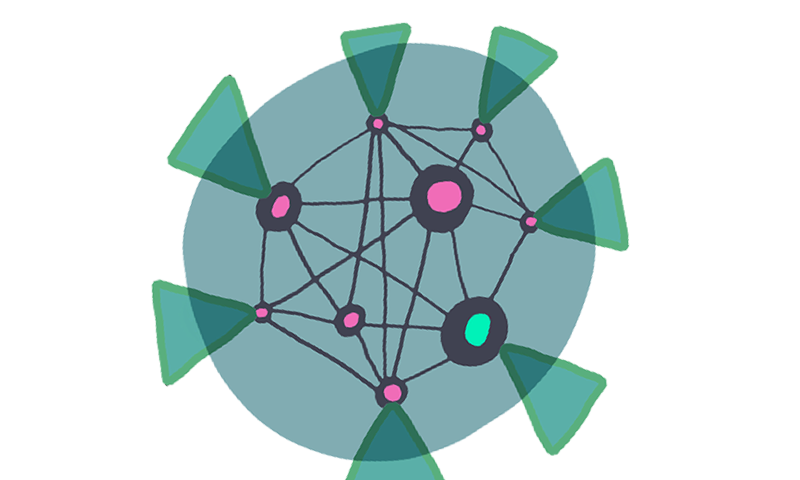Sugata MitraLearning itself is an emergent phenomenon. It’s not about making learning happen – it’s about letting it happen.
Made by Many launches Sugata Mitra's School in the Cloud at TED2014

A small team from Made by Many is on a very special mission this week: we’re at TED 2014 in Vancouver and TED Active in Whistler to unveil one of the most extraordinary projects we’ve ever worked on.
Since TED 2013 in Edinburgh last February, we’ve been working with the 2013 TED Prize-winner Sugata Mitra to help him build the School in the Cloud with a remarkable set of partners including Microsoft and Skype Social Good, Newcastle University and the TED community.
We’ve just watched Chris Anderson on the main stage in Vancouver, where he updated the TED community on the huge progress that Sugata and his partners have made. Just nine months ago, the School in the Cloud was a wish. Today, it is a reality. It’s live – and this is just the end of the beginning.
Sugata Mitra has conducted many experiments since 1999 that have demonstrated that groups of children can learn almost anything by themselves, given internet access and the ability to work together.
Sugata suggests that the idea of "knowing" is obsolete. Instead, children can achieve more in Self Organized Learning Environments (SOLEs) where they answer Big Questions with minimal guidance from teachers, parents or from Grannies – volunteers who are not necessarily real grandparents and who use Skype to talk to them.
Ultimately, for Sugata, the answers are not as important as the process, through which the children teach themselves to research, to organise, to present their ideas, to learn and explore their curiosity.
Sugata’s TED Prize wish was to build a global experiment to help him test his methodology in a wide range of settings and contexts. This started with seven new labs opening across India and the UK, with two opening just last week in rural West Bengal.
Grannies will help run and facilitate these SOLEs using Skype. Our involvement started with a need to help the Granny cloud scale, it was soon apparent that there was an additional opportunity: to design an innovative digital product to scale School in the Cloud far beyond the seven labs and build something with the potential to create change on a global scale.
We feel exceptionally privileged and lucky to be involved. Our amazing clients at Microsoft and Skype Social Good had been introduced to Sugata through their role as TED's Conversation Partner, and they asked us to assess the feasibility and scope of the School in the Cloud. Sugata was intrigued by our name and what it means, as well as by our experimental, human-centred and evidence-based way of working, which fits exceptionally well with his research methodology.

Made by Many’s track record developing Skype in the classroom - another project that involved blowing the walls of the classroom out and using technology in an innovative way for learning – put us in a great position to help bring Sugata’s vision to life. Because of Skype in the classroom we are used to co-designing with educators, and we’ve learnt a lot about iterating through rapid cycles of software development and design, informed by a continuous stream of human insights from end-users. We couldn’t have achieved so much in such a short space of time, or kept the product so needs-driven, without this approach.
The most exciting thing about this project was the unique challenge it presented. We needed to create one place in which a previously disparate community could come together, and provide a scalable solution for the Granny cloud. We had to find new ways of explaining the SOLE methodology so that any teacher, parent or community could try it.
But beyond that, School in the Cloud is about making sense of all Sugata’s experiments to date, taking them from academia to a mass audience, making them equally accessible to children around the world, and ultimately bringing education to those who need it most.

We have a mantra of sorts at Made by Many: Make, Test, Learn. Understanding what has come before our involvement is a core part of our process. Before we even started exploring where we could add value, we took the time to understand how Sugata's work had reached this point and made sure we understood the theories and methods that underpin his research.
Following some initial workshops with Sugata, Skype Social Good and IDEO, we immersed ourselves in the experiences of everyone involved in self-organized learning.
We spent hours watching Grannies speak to kids in India on Skype, had conversations and went on field trips with educators running SOLEs, and even ran our own SOLE sessions here at the office to fully understand the challenges involved.
We took what we had learned and began sketching out ways to unify and integrate all these previously disparate communities within a single experience - then we showed them to the people who had helped us reach this point.
With their help, we identified three opportunities to add value:
- Help the Granny Cloud scale by allowing it to self-organize more efficiently
- Make tools for kids to use during SOLE sessions that facilitate the development of core skills
- Create a global community around self-organized learning

Within a couple of weeks we had built a foundation platform to serve the needs of the Grannies, which we invited them to explore and test, before returning to tweak again. Over the following months the platform took shape as we moved through cycles of Make, Test, Learn – working all the time with our various end-users.
Of course, asking the users means asking the children too. They wanted lots of tools. They also wanted Minecraft and Snapchat but mostly they wanted powerful search tools and simple presentation tools. We built a special search tool for them. Partly this was to address concerns such as allowing them to search the web safely but, more importantly than that, it was about giving them an interface that was as distraction-free as we could make it, allowing them to concentrate on their task.
Here's a little preview of what we've built for them, starting with the educator's experience:
... and how the kids engage with the session:
This experience represents a SOLE session at its simplest, however the kids don't need to use those tools in a SOLE if they don't want to. In our testing we found that pen and paper remain vital to the process. This mindset was vital when working with something like self-organized learning, which is still an ongoing experiment. We had to avoid being prescriptive and allow room for people to make their own discoveries that will help us to shape the platform in future.
Those opinions also fed into the process and we used them to shape a product that we are very proud of. In fact, we believed in the project so much that we would later invest ourselves and become a partner, alongside TED, Microsoft and Skype Social Good, and Newcastle University. Most important of all, the children love it.
What we have created is a platform for learning - the work is not finished. We are learning just as much from this platform as the children are. School in the Cloud has much to teach us, as product designers, and academic researchers about self-organised learning and its future.
Continue reading
We looked at social media’s role in digital services. You won’t believe what 5 things happened next!
In February I was asked to do a talk at Social Media Week in Barcelona. This conjured up images of social media specialists that ‘do the circuit’. I had t...
Creating an Editorial Brand from a Minimum Viable Product
The brand identity of a digital product or service is becoming an increasingly important part of the projects we're working on at Made by Many. As an inte...
Hackaball
Hackaball on KickstarterThe circuit boards are soldered, the connectors are aligned, the casings are complete… We’ve been going flat out to finish seven p...


